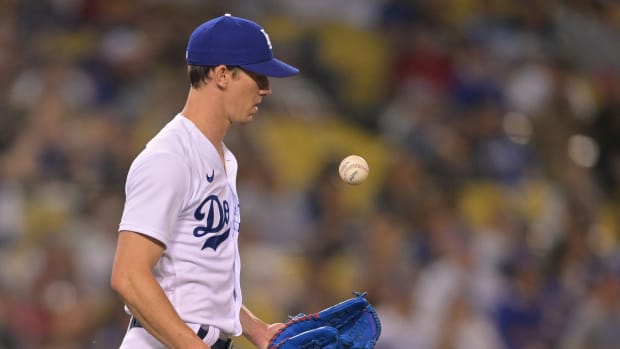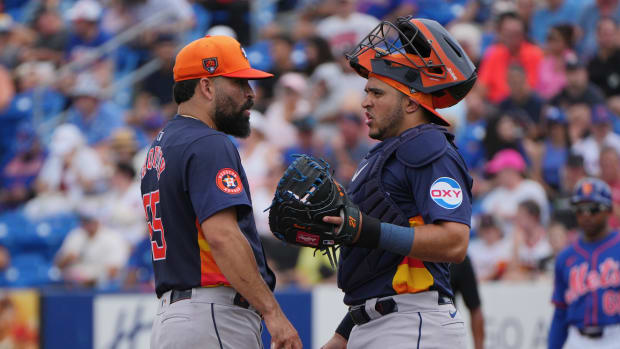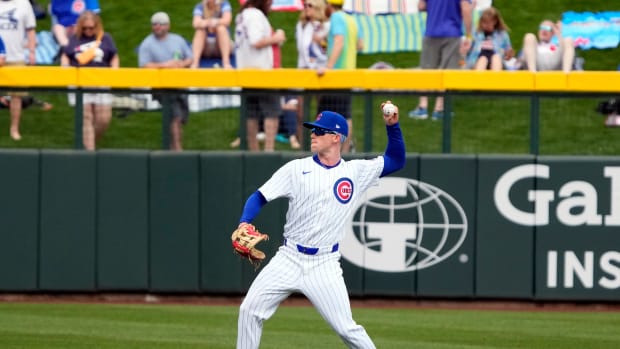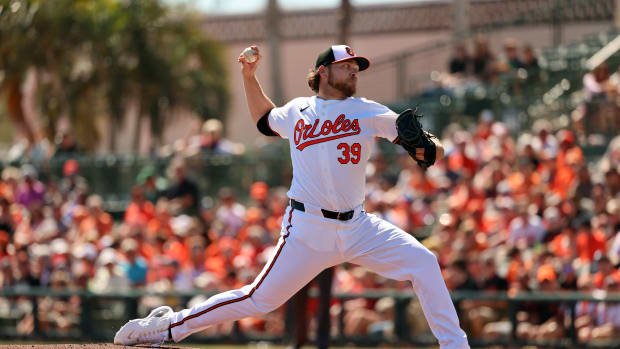
Trade deadline review: Losers
Even getting Joe Blanton from the Phillies wouldn't have been the major upgrade the Orioles' starting rotation needed. (Al Tielemans/SI)
Contrary to the belief that changes in the Collective Bargaining Agreement and the addition of a second Wild Card in each league would lead to a quiet trade deadline, a flurry of activity took place leading up to the bell on July 31. Here, in alphabetical order, is a quick recap of the teams whose dealings— not just on Tuesday, but in the weeks leading up to it — fell the furthest short of the mark.
Arizona Diamondbacks: They certainly talked big leading up to the deadline in exploring deals for Justin Upton and Stephen Drew, but while there's no shame in not finding a deal for the former given the gap between his current struggles and his overall ceiling, given the latter's pending free agency and the market for shortstops among other contenders, not dealing Drew feels like a mistake. The Diamondbacks also failed to land a frontline starter — which admittedly would have been a surprise — despite exploring deals for Matt Garza and Cliff Lee, and they went backwards at third base.
On July 25, Arizona traded third baseman Ryan Roberts to the Rays for 25-year-old Double-A second baseman Tyler Bortnick; though he was struggling (.250/.306/.357), Roberts was just one-season removed from a 19-homer breakout, and both his career line (.250/.330/.398) and versatility (experience at second base and in leftfield) suggested he could help the club even in a smaller role. On July 29, the D-backs acquired third baseman Chris Johnson (.274/.314/.421 career), a player lacking Roberts' plate discipline, versatility or defensive skill, from the Astros for two minor leaguers. Add it up and it's a puzzling set of moves and non-moves for a team that's 53-51, 3 1/2 games back in the NL West and 6 1/2 back in the Wild Card.
Baltimore Orioles: Their −51 run differential still suggests they're more pretender than contender, but at 55-49, the Orioles are running third in the AL Wild Card race. With a rotation that ranks 10th in the league in ERA at 4.73, they would have been helped only so much by the addition of Joe Blanton (4.59 ERA, with a league-best 6.4 K/BB ratio offsetting a gaudy 1.5 HR/9), but they couldn't get that deal done despite exchanging medical records with the Phillies. They also missed an opportunity to shore up any one of a number of positions — first base, second base, leftfield — that they could have used offensive help. It wouldn't have made sense to deal blue-chippers Dylan Bundy or Manny Machado, but for general manager Dan Duquette to do nothing that would at least increase the odds that they finish over .500 for the first time since 1997 was a missed opportunity.
Boston Red Sox: Adding lefty reliever Craig Breslow for righty reliever Matt Albers and outfielder Scott Podsednik rises slightly above a "look busy" bullpen move, since it enables the Sox to move lefty Franklin Morales back to the rotation, where he's put up a 3.42 ERA and 31/8 strikeout-to-walk ratio in 26 1/3 innings. But given the situation in which Boston finds itself — in fourth place and 7 1/2 games back in the AL East, sixth in the Wild Card at 3 1/2 games back — it doesn't need an excuse justify starting one of its five best pitchers amid a rotation that ranks 11th in ERA at 4.84. It's a move the Red Sox should do.
General manager Ben Cherington and company also missed an opportunity to upgrade at shortstop, where Mike Aviles is hitting a dismal .252/.275/.395. But more than anything else, the Red Sox missed an opportunity to shake up the clubhouse culture by dealing one of their rotation's problem children, Jon Lester or Josh Beckett. Neither has delivered anything close to their capability or is at the peak of their value, but dating back to last year's collapse, they have appeared to be at the epicenter of a rather disharmonious situation. Dealing either would have been akin to Theo Epstein's bold trade of the iconic Nomar Garciaparra at the deadline in 2004 — a move made as much for non-baseball reasons as for baseball ones, one that had a happy ending for a foundering ballclub. The Sox did talk to the Rangers, Braves and Dodgers about a deal for Beckett; given that the $31.5 million remaining on the 32-year-old righty's contract after this season should pass through waivers, they can revisit dealing him in August.
For now, Boston will hope that its four-game winning streak is the spark it needs, just like it hoped that the Kevin Youkilis trade or the returns of Ellsbury and Carl Crawford were the sparks.
Cincinnati Reds: Adding Jonathan Broxton as a setup man fortified a bullpen that owns the game's lowest ERA (2.61) and highest strikeout rate (10.2), not that the former Dodger closer misses bats with the frequency he once did; he's striking out 6.3 per nine, well below the 11.7 he struck out from 2005-2010, before his elbow troubles got the better of him. Still, the Reds' failure to add a centerfielder and/or a leadoff man sticks out like a sore thumb given the underperformances of Drew Stubbs (.233/.301/.403) and the team's leadoff hitters (.201/.247/.306). They lost out on Shane Victorino to the Dodgers, tried unsuccessfully to get Denard Span from the Twins and in the end couldn't even land fallback plan Juan Pierre form the Phillies. They were also said to be seeking rotation help, showing interest in Matt Garza and Josh Johnson, but came up empty there as well. At 62-41, they own the game's best record, but they missed a significant opportunity to improve.
Oakland A's: They did fill a need on Saturday by adding George Kottaras, a backup catcher who has the kind of patience (a career 13.4 percent walk rate) and pop (a career .181 isolated power, on .221/.324/.401 hitting) that compensate for a low batting average. Still, the A's had glaring needs at shortstop and third base — two positions that have produced a combined .190/.262/.316 performance in 20.6 percent of the team's plate appearances — and they couldn't find a fit, even with Hanley Ramirez, Jimmy Rollins, Stephen Drew and Yunel Escobar among the players available to at least some degree, and lesser guys like Ryan Roberts and Chris Johnson swapped in the days leading up to the deadline as well. With Brandon McCarthy, Brett Anderson and Dallas Braden all rehabbing their way back to Oakland, and 23-year-old righty Dan Straily striking out 11.4 per nine in Double-A and Triple-A, Oakland could have offset the cost of a significant acquisition by dealing a starting pitcher elsewhere.
St. Louis Cardinals: Like the Reds, the Cardinals did add a bullpen piece in Edward Mujica, but adding a bullpen piece is the default move of a contender — every one of them could use an extra arm, and getting one makes a general manager look busy enough to evade at least some criticism. What St. Louis GM John Mozeliak didn't do was add a starting pitcher to help ease the blow of losing Chris Carpenter for the season and facing uncertainty regarding the return of Jaime Garcia, who has battled elbow and shoulder troubles while missing the past two months. For as good a job as Lance Lynn has done, at some point he is likely to run out of steam; after throwing 109 2/3 innings last year, he's at 121 now. As for Mujica, he's a homer-prone setup guy (1.4 HR/9 this year, 1.3 career) with a 4.38 ERA — not to mention a declining strikeout rate — joining a bullpen that's 10th in the league in ERA at 4.09, and 14th in homer rate (1.1 per nine). Particularly given the strength of their farm system and the fact that they're four games back in the Wild Card, and seven out in the NL Central, the defending world champions could have done a whole lot better.



































